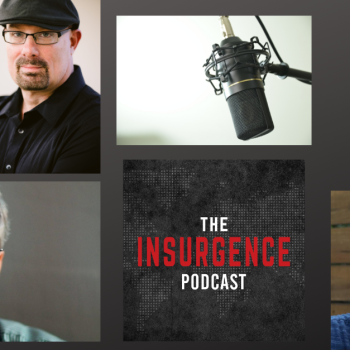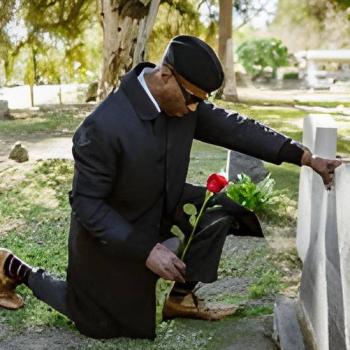How does scripture fit into a Progressive theology?
While Progressive Christianity may not view scripture as either the transcribed words from God's mouth or a science and history textbook, as are the common perceptions, it is very important and essential to our faith. The Bible is that narrative of our people and our evolving understanding of God and what God desires of us. The Bible has flaws, contradictions, and has a great deal of passages that discuss supposedly "godly" people advocating and doing some very awful and reprehensible things—and I think we should be honest with that and speak against those passages in the Bible that contradict the nature of God as Jesus shared it with us, that contradict the good nature of our own consciences.
How do we know what God's justice really is? What, or who, is defining it?
We see throughout the biblical narrative—in both the Jewish scriptures and in the Christian Testament—that God (whoever or whatever God is) continually calls us to a higher ethic. There is an evolution—not of God, necessarily—but of our understanding of God and God's desire for the world.
God's narrative begins as a tribal God of Abraham and a nomadic people. This early understanding paints a picture of a God that has no problem killing first-born children of another nation to get his/her/its way. This understanding of God reveals a God who commands his followers to invade a land and kill every man, woman, and child. Whenever the Israelites won a battle in Canaan, they attributed it to the will of God and that God was on their side (sounds familiar today, doesn't it?). But God's story doesn't end there. The judges and prophets continue to come and point to a continually progressive (you like how I added that word in here?) idea of God and God's nature until we finally get the prophet Micah to proclaim "What is that God asks of you? Do what is right, love mercy, and walk without pride by God's side" (Mic. 6:8). Then Jesus continues this narrative by pushing the limits of God's grace, justice, love, and inclusion even further. The story doesn't even end there; it is continuing today with you and me.
You can call it whatever you like—the Holy Spirit, your conscience, or the cricket on Pinocchio's shoulder—but there is a voice inside our heads and our hearts that continues to push us forward, to push and break these limits that we have built that deny us from fully understanding and embracing the true love, grace, and inclusion that is found in and encompassed by the Creator.
What vision of the kingdom of God are we aiming at?
I'm striving—as I know many others are and have—to recreate and advocate for that community that was described in the book of Acts (4:32-34) where "all were one in heart and mind. No one laid claim to any possessions, but shared freely all they had . . . God's grace worked through them all that there were no needy among them." I personally see God as the only authority, period. If the laws of whatever land I happen to be living in command me to obey something God has already called me to do, then great; I was doing it anyway. But if the law of the land demands I obey a law that goes against God's conviction in my heart, I must disobey it. I think that's what got the early Christians in trouble and it should cause us modern day Christians to get into trouble too.
How many of us are standing opposed to our government's blatant use of torture and violence to get what they want? How many of us are standing with the poor and marginalized in the world instead of making excuses as to why it's their fault they're in the situation? We as Christians have lost our collective backbone; we've contracted Stockholm Syndrome with this nation, falling in love with the lunacy of America and forgetting that our true citizenship is in God's kingdom.
What role does obedience have in the process of Christian discipleship?
Obedience. That's a word that makes so many of us cringe, doesn't it? I think it's less about obedience and an attempt to follow the teachings and example of Jesus. We're all going to mess up; we're all going to fall short of what we're capable of being. But that's where love comes in. We're only human, after all. The point is that we continually make a honest effort to follow God and do the things that create love, justice, and equality in this world.
What does it mean to be a "welcoming" community?
I think the modern context of this phrase is that the community is welcoming, open, and affirming of the GLBT community. I think this statement is very important as these brothers and sisters are some of the most marginalized and persecuted people in the world who are constantly told how much God hates them. God loves and accepts these people for who they are and we should all grow up and do the same.




